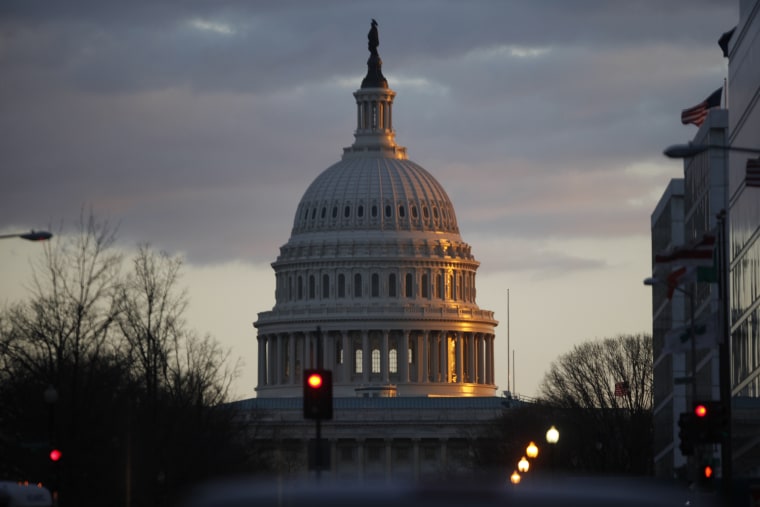Good news, America, your government's lights are still on.
With just hours to spare, Congress approved a funding bill that will prevent a government shutdown -- at least until December. President Obama signed the legislation, the White House said late Wednesday. The House of Representatives on Wednesday afternoon passed a short-term spending plan by a 277-151 vote margin. The bill, however, only keeps the government funded until Dec. 11, around the time when the Treasury Department is expected to hit the debt ceiling and run out of borrowing authority.
With this Republican-led Congress, the bar has been lowered for what constitutes "successful governing," but there's no reason anyone should see yesterday's developments as a meaningful accomplishment. As recently as last week, the odds of another GOP-imposed shutdown were quite high, and lawmakers managed to avoid a disaster with mere hours to spare.
The only thing that prevented a shutdown in this case was the unexpected resignation of Congress' most powerful member -- the one whose members were prepared to ignore his pleas.
In case it's not obvious, 21st-century superpowers aren't supposed to operate this way.
But before we turn our attention to December, when the threat of a shutdown will be real once more, last night's House vote is worth considering in detail. At first blush, the outcome appears one-sided -- the stop-gap spending measure needed 218 votes to pass, and it ended up with 277.
What matters, however, is how those 277 votes came together -- because under the rules Republicans usually play by, this bill shouldn't have even reached the floor.
Take a look at the roll call, and note that only 91 House Republicans voted for the bipartisan measure to prevent a shutdown. The House GOP conference has 247 members, which means only about a third of them were on board with their leadership's plan to keep the government's lights on.
In fact, some of the members seeking posts in the new Republican leadership team -- Reps. Tom Price (R-Ga.) and Pete Sessions (R-Texas), for example -- were among those who voted to reject the resolution to this mess.
It was not, in other words, a popular solution with House GOP lawmakers, many of whom would have much preferred to simply shut down the government and impress the Republican Party's far-right base.
That alone should have derailed the legislation, at least according to informal "rules" the House GOP majority usually like. Remember the "Hastert Rule"?
To briefly recap for those just joining us, under the Hastert Rule -- which isn’t an actual, formal rule -- a Republican Speaker of the House is only supposed to bring bills to the floor that most of his own caucus supports (measures that enjoy a “majority of the majority”). The idea is, Republicans shouldn’t even consider bills if they’re dependent on Democratic votes to pass -- the real power belongs in the hands of the House GOP’s far-right rank and file.
In practice, however, that's easier said than done. When Boehner needed to raise the debt ceiling last year, for example, he ignored the Hastert Rule, went to Democrats hat in hand, and prevented a sovereign-debt crisis. The same thing happened when reauthorizing the Violence Against Women Act. And when the House needed to pass a relief bill after Hurricane Sandy. And when the nation faced the so-called "fiscal cliff."
And as of late yesterday, to prevent a government shutdown.
Boehner will remain Speaker for another month, and he may yet choose to govern this way -- which is to say, effectively -- again before he exits the stage. It does, however, raise an important question for his would-be successors: what will take precedent for the remainder of this Congress, constructive governing or fealty to a made-up Hastert Rule?
